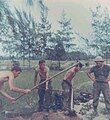My Lai massacre
Photographic evidence
[edit]Exhibit numbers dedicated to photographs are as mentioned by the Report of the Department of the Army Review of the Preliminary Investigations Into the My Lai Incident, Volume III, Book 6.
Haeberle B&W
[edit]These black and white photographs were taken by an Army-issued Leica M3 camera. They show soldiers in action, the sort of pictures required by the PR officers Haeberle was working for.
-
P–2
-
P–3
-
P–4
-
P–5
-
P–6
-
P–7
-
P–8
-
P–9
-
P–10
-
P–11
-
P–12
-
P–13
-
P–14
-
P–15
-
P–16
-
P–17
-
P–18
-
P–19
-
P–20
-
P–21
-
P–22
-
P–23
-
P–24
-
P–25
-
P–59
-
P–60
-
P–61
-
P–62
-
P–63
-
P–64
-
P–65
-
P–66
-
P–67
-
P–68
-
P–69
Negative films
[edit]-
P–1
-
P–70
Haeberle Color
[edit]Haeberle took these photographs with his personal Nikon F camera, for which he had one 36-exposure roll of color film, which meant he did not have to turn in photos to the army's Public Information Office. These photographs depict atrocities done by American soldiers. Years later, Haeberle admitted that he had destroyed a few of photographs he took during the massacre, saying "I destroyed two images. They were of a couple of GIs, where you could identify them doing the killing. I figured, why should I implicate them—we're all guilty—there were one hundred-plus of us there."
-
P–26
-
P–27
-
P–28
-
P–29
-
P–30
-
P–31
-
P–32
-
P–33
-
P–34
-
P–35
-
P–36
-
P–37
-
P–38
-
P–39
-
P–40
-
P–41
-
P–42
Smail Color
[edit]John Henry Smail of the 3rd Platoon, took at least 16 color photographs depicting U.S. Army personnel, helicopters, and aerial views of Mỹ Lai.
-
P–125
-
P–126
Alaux Color
[edit]First Lieutenant Roger L. Alaux Jr., a forward artillery observer, who was assigned to Charlie Company during the combat assault on Mỹ Lai 4, also took some photographs from a helicopter that day, including aerial views of Mỹ Lai, and of the Charlie Company's landing zone.
-
P–202
Congleton Color Slides
[edit]Photographs provided by Specialist Fourth Class Lawrence L. Congleton.
-
P–208
-
P–215
Courts martial
[edit]-
Chain of command responsible for the unit
Mug shots of personnel charged
[edit]-
2nd Lt. William L. Calley Jr.
-
Capt. Ernest L. Medina
-
Capt. Eugene M. Kotouc
-
Maj. Robert W. McKnight
-
Maj. Charles C. Calhoun
-
Col. Richard K. Blackledge
-
Col. Nels A. Parson, Jr.
-
Col. Oran Henderson
-
Col. Robert B. Luper
Congressional investigations
[edit]-
Hearings
-
Report







































































